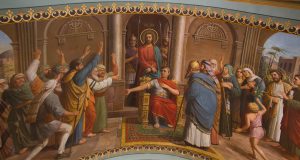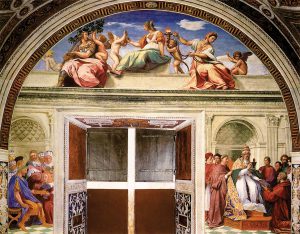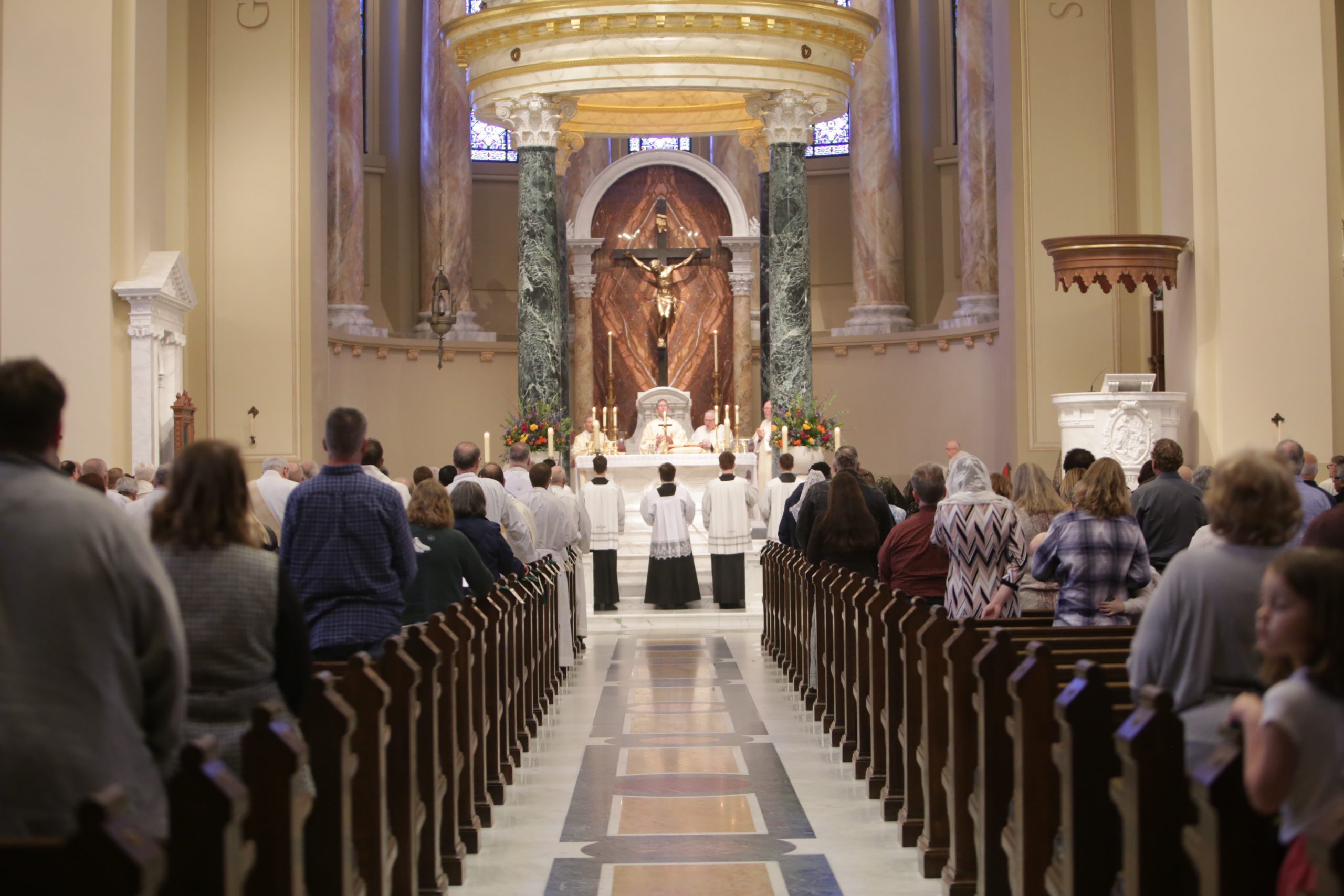
By Laura Melius
What is the Church?
As Christians, this question can bring many images to mind. Perhaps it is the church building where we grew up or the building where we now worship each Sunday. Maybe we think of our Church leaders such as Pope Francis or our former popes who have led the Catholic Church through the centuries.
Or, maybe our definition of the Church is the parishioners, the family of believers, who gather in our parish each Sunday and every parish around the world.
The Catechism of the Catholic Church (CCC) speaks about what the Church is in a variety of ways, including these: “The word ‘Church’ means ‘convocation.’ It designates the assembly of those whom God’s Word ‘convokes,’ i.e., gathers together to form the People of God, and who themselves, nourished with the Body of Christ, become the Body of Christ” (CCC 777). In other words, the Church is God’s family, consisting of all of us, those who are disciples of his son, Jesus. It’s critical that we understand what the Church is so we know the importance of our role in it and how we are to live that role.
A Church given and shared
While the Church was “born” from the side of Christ on Good Friday, as seen in the blood and water that flowed from his side, it was at Pentecost and the descent of the Holy Spirit that the apostles began the process of sharing the faith, with the Church spreading throughout the world. St. Peter, the “rock” on whom Jesus built his Church, became the first shepherd of the Church in Rome. Over the centuries, 265 popes have led the Church, with a great number of these leaders being recognized as canonized saints.
We recall the apostolic beginnings of the Church each Sunday when we profess the four marks of the Church—one, holy, catholic and apostolic. As “one,” we profess there is one Church that Christ founded with one mission for Christ. By “holy,” we are setting the Church apart for God, Jesus as Son of God, and the Holy Spirit. As “catholic,” we are not referring to the “name” of the Church, but to the original meaning of “catholic,” as in “universal,” Christ giving the fullness of the faith to the Church and the Church reaching out to all people, everywhere and for all time. Finally, as “apostolic,” we recall the start of the Church and remember its mission to preach the faith to all.
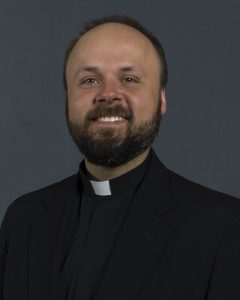
Our connection to our apostolic faith, this one faith handed down from the apostles, is a source of unity for Catholics. Our pope is the greatest visible example of this unity. Father Jordan Samson, pastor at Christ the King Parish in Sioux Falls, explains this further.
“The pope is a source of unity because we can point to his office,” he said. “Where Peter is, where Peter’s office is, is a guarantee of where the Church that Christ founded is located. Pope Francis holds the Chair of Peter, and for us as Catholics, we remain united to the Chair of Peter. We are also guaranteed that in matters of faith and morals, the Church is preserved from error by the Holy Spirit.”
Suzanne Semmler, director of religious education at Holy Cross Parish in Ipswich, finds unity and strength in the Church’s apostolic succession as a lay member of the Church.
“It is because we know the Catholic Church has carried through the centuries that makes it a faith that can withstand every trial that comes,” she said. “It gives us reason to trust in God’s plan for the Church and our lives.”
Father Samson explained that although our Church leaders’ main purpose can sometimes be misunderstood, our local priests and bishops have first and foremost been entrusted to preserve and pass on the faith in our parishes, not to make up new doctrines. Additionally, as they strive to lead the lay members of the Church in holiness, they are sustained by the prayers of the faithful.
“Every Mass, we pray for Pope Francis and Bishop DeGrood, not necessarily because we agree with every prudential or pastoral decision they make, but because they are guarantees that we are in the Church that Jesus Christ founded,” Father Samson said. “We as clergy have a higher standard and ought to set examples of holiness. It doesn’t mean we always do, but I guess that is why we pray for our leaders frequently.”
Suzanne has made praying for Church leaders a priority and a habit in her daily life, as she recognizes they depend on our prayers in their battle against the influences that can distract us from our faith.
“We were taught as kids when you pass a Catholic church or cemetery to make the sign of the cross; for me that is a time to also say a Hail Mary for the pope and our bishops and others who guide us,” Suzanne said. “I pray for the pope and our bishop by name asking that the Holy Spirit guide and strengthen them.”
Role of lay faithful
Under the guidance of the clergy, the Church’s lay believers also have a responsibility to pass on and preserve the faith as the first apostles did through their evangelization.
“Parishioners reach so many people that priests and religious cannot,” Father Samson said. “The work of the Church is meant to be carried out by the laity when they go out and live as Christians in the world.”
“Evangelization isn’t about age,” Father Samson clarified. “It’s about being alive in Christ and sharing that life with others. Granted, it can be helpful to have similar ages find common spaces to form friendships around common life experiences. But to put the responsibility of evangelization upon one age group would be too limiting.”
We often think that great evangelization happens in planned events or spaces, but it can often happen in unexpected places. Suzanne has seen the children of her parish be quite effective evangelists in their friend groups, citing one recent example.
“Just the other day, I had a young lady, who is 8 years old, tell me that while she was at baseball practice, some of the kids were talking badly and it bothered her,” Suzanne said. “She told them they shouldn’t talk that way. She said she was scared at first, but she knew that Jesus would want her to tell them. I think that is one of the things we need to be teaching our kids, to be courageous in speaking to their friends about right and wrong. My hope is that when those young people are together and interacting, they will help each other be better and more loving.”
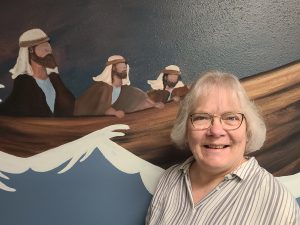
If the Church body—that’s us, the members of the Church—is to be ready to reach out to others effectively and consistently, Father Samson says that both daily prayer and regular receiving of the sacraments are vital to accomplish that mission, as well as an additional component.
“Parishioners strengthened by the Eucharist and regular reconciliation and strengthened by holy friendships can carry out the work of spreading the Gospel in their day to day lives,” he said.
If a parish’s members strive to be healthy in prayer and in receiving the sacraments, how can a parish help in the formation of these holy friendships?
Father Samson says this begins with building and strengthening relationships within the parish itself.
“As families come together to make a parish, the parish as a whole should feel like a larger family,” he said.
Although it may seem like a parish would naturally feel like a large family, that is not always the case, especially in our present transient culture. There can be several obstacles to achieving a family atmosphere.
One thing Father Samson has observed is that sometimes people can see themselves as perpetual guests in their own parishes, and they may not commit to investing in relationships or connections with fellow parishioners. He attributes this to several possibilties, such as approaching Mass attendance as merely an obligation, or attending different parishes based on one’s schedule. Families also move more and travel more than in past generations. All of these factors and more can play into a lack of healthy and supportive relationships within the parish.
“While it’s awesome to see people make Mass a priority by fitting it into their weekend when traveling, we also need to know we belong somewhere—that we have a home, a family. Something is missing when the full family isn’t there,” Father Samson emphasized.
Relationships build unity
The start of nurturing relationships can be quite simple, as our great-grandparents knew what they were doing when they gathered for picnics, sewing circles and other social gatherings on Sundays with their fellow parishioners. Although Father Samson admits it might be cliché, Christ the King Parish serves coffee and donuts every Sunday morning after Mass.
“The weekly opportunity to catch up on a human level and build friendships has become a huge part of our life as a parish family,” he said.
Suzanne said the parish family at Holy Cross tries to nurture a family atmosphere by welcoming all families who walk through their doors and by offering ways for them to deepen their faith life as a family. The parish holds monthly fellowship after Mass for most of the year, and holds adult faith formation in the form of book studies or video series during Lent and Advent.
“We also offer an ongoing small group that gathers twice monthly throughout the year for anyone to come and share in a discussion about a particular topic. Prayer is a big part of that group,” Suzanne said.
Holy Cross Parish has encouraged their youngest members to form friendships, too, by forming a youth choir consisting of elementary-aged children.
“They are taught the Mass parts and some hymns, and once a month they are the choir for our Sunday Mass,” Suzanne said. “We plan to expand that opportunity to some of the older youth who would like to participate in the future.”
This support for parish families and the parish family as a whole is something Holy Cross Parish will continue to nurture.
“There is much more we can do to help families become little domestic churches within our parish, and I hope we can all work together to build and grow,” she said.
Called to imitate Christ
To stress the importance of the Church’s apostolic mission, Father Samson pointed to a quote by Father Luigi Giussani, a 20th century Italian priest and theologian, which reads, “Christ continues in history, in our times, within the mystery of the church….Therefore, the invitation to imitate Christ is addressed to all men, but first and foremost to us who have been baptized, as authentically indicated by the Church.”
In other words, if we have been baptized, we are called to share the good news of Jesus Christ. As the Church looks to the future, Semmler believes that we all need to strive to be bold in this mission.
“We need to be people who are not afraid to tell others about the love that Jesus has for us, and tell others that it is available to all God’s children,” she said. “Let them know that they are loved unconditionally and live that love by accepting each other wherever they are in their journey. At the same time, we need to be bold in speaking the truth of the Gospels. We need to be people of prayer, leaning on Jesus and Mary for our strength and be committed to our prayer for each other.”
Father Samson believes that the future Church will need to look at the faith through the correct lens and be ready to carry our daily crosses, as Jesus asks us to do, as we go forth as present-day apostles.
“We need to live faith as a way of life and not as a mere obligation,” he said. “And, we need generous hearts who involve themselves and follow the Catholic Church, even when it might be difficult.”

